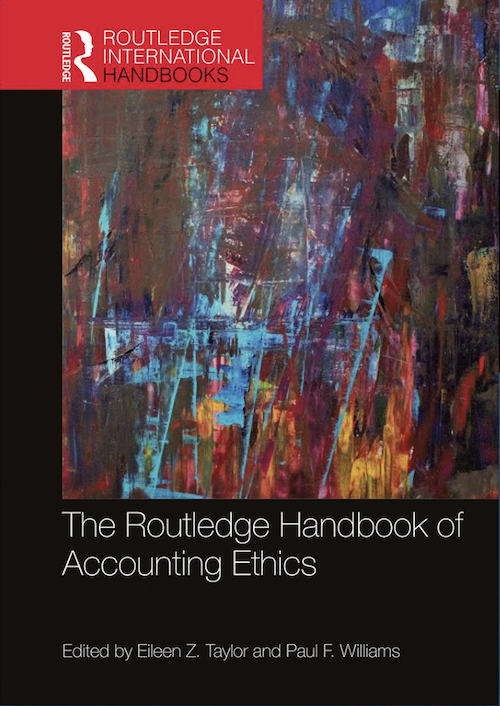Keeping Accounting Accountable—A Q&A with Eileen Taylor and Paul Williams

Eileen Taylor and Paul Williams are two professors of accounting at NC State Poole College of Management who combined forces to edit The Routledge Handbook of Accounting Ethics, a unique compilation of diverse perspectives that examines the ethical complexities of accounting across time and culture. They spoke with the Poole College of Management to share the full story behind their latest project.

What expertise do you bring to the field of accounting ethics?
Williams: I began writing research papers on the notion of fairness and ethics in accounting back in the 1980s. The typical perspective on accounting is that it’s a technical language that has to do with measuring assets and liabilities. But accountants are more than just purveyors of professional expertise. They have an ethical responsibility to their profession as well. I wrote a paper on the concept of fairness in accounting and another on the concept that accounting is a moral language, and I went from there. I’ve been at this a long time. When Routledge invited me to assemble a collection of articles related to accounting ethics, I jumped on the idea and invited Eileen to join me.
Taylor: My background is in accounting and information systems, but I began to pursue a direction in whistleblowing when it became a hot topic of research after the many business failures of 2002. Since then, I’ve written and edited a number of articles related to business ethics, data security, and critical thinking in addition to whistleblowing. I also led the development of an ethics course at the Poole College of Management, which we are working to integrate into our MBA core curriculum.
What motivated you to write this book?
Taylor: Most books related to accounting ethics are “how-to” books. We identified a need for something different. Our book isn’t a codebook or a rulebook that a CPA can pull off a shelf to read a step-by-step plan for addressing a specific ethical dilemma. Instead, we present a series of conversations that educators can use to help accounting students develop critical thinking skills surrounding ethical issues in their profession. The hope is that students will walk away with an idea of how broad and multifaceted the discussion about ethics and accounting really is.
Williams: We encountered plenty of books that use formulas and decision frameworks to think about ethical dilemmas, but they miss the underlying stories. We include a storytelling chapter in the book because people understand ethics through the stories we tell. Our book also helps to stimulate debate in the classroom through telling the same story from two perspectives. For example, we have two different chapters on taxation. The main idea of one chapter is to find ways to pay the bare minimum of taxes, while the other chapter presents taxation as a positive thing, a price we pay for citizenship.
How did you choose the topics and authors?
Williams: We placed a high priority on including a wide range of global perspectives to demonstrate the diversity of thinking in accounting ethics. We invited a number of experts to submit their own ideas, and we didn’t say no to any of them. Tying the chapters together at the end of the process was a difficult but worthwhile endeavor.
Taylor: If you stay in your bubble, you only hear back what you already think. That’s why we opened up the book to such a wide authorship. We have a chapter on feminism and ethics. We have perspectives from different disciplines within accounting. We also have three religious-themed chapters on ethical perspectives in Judaism, Christianity, and Islam. It was fascinating to see the ways each perspective overlapped. The Torah, Bible, and Quran all regard charging interest on loans as a negative thing, for example. They all consistently focus on making the world a better place and working together fairly, not just on a personal level but in their business dealings.
What does ethical behavior look like in the day-to-day work of accounting professionals?
Williams: It largely depends on your work environment. To our detriment, we tend to focus too heavily on Big Four public accounting. If you’re an auditor in any setting, you have to make moral judgments about whether or not certain programs are benefiting the people they are supposed to benefit. You serve as the public’s eyes and ears inside an organization. In my former workplace, what is now the Government Accountability Office (GAO), ethical questions arose whenever we had to assess government programs. Administrative ends always involve the potential for administrative evil. Take the famous case of the German railway accountants who fastidiously prepared accurate bills for the Gestapo based on counting the number of persons traveling only one-way to their horrific destinations. This is an extreme example, but it points to the fact that it’s easy to lose sight of the bigger picture and forget to notice what end it is that you’re actually accomplishing.
What other ethical paradigms shifts are needed within the accounting profession?
Williams: The profession needs to take more seriously the idea of accounting as a profession that actually holds people accountable and provides social benefit in the process. The financial reporting revolution, which began in the 1970s, coincides with an era of unprecedented concentration of wealth and income in the U.S. Accountants need to take a hard look at how they contributed. One key factor is the way we measure so-called earnings. Labeling them earnings doesn’t mean they are earned. I often use the example of tech companies that make billions of dollars from products based on the technology of the internet. U.S. taxpayers funded that technology via space exploration and defense projects, and now tech moguls reap the profits without any equity interest trickling back down to taxpayers. Or think about oil and gas companies that benefit from billions of dollars in military spending to guard their properties around the world. That’s not an expense on their income statement. As a profession, we need to do a better job of acknowledging externalities, both positive and negative, that affect the bottom line.
Taylor: The accounting profession must also work toward developing a more nuanced, balanced approach to new technologies that are proliferating. I’m thinking of a chapter in our book that examines the ethical dimensions of bitcoin and other forms of cryptocurrency. Blockchain, the underlying technology that enables people to buy and hold cryptocurrency, provides a tremendous tool for recording transactions that should result in more transparency and more control. On the other hand, we know that Blockchain is frequently used for black market activities. Transparency falls flat if we’re enabling terrorism. We have to think beyond the obvious benefits of a new technology to avoid enabling harmful forces in our society.
In what ways has the Poole College of Management provided a supportive environment for research?
Taylor: We felt free to include any topics we wanted. It was incredibly beneficial to work free of constraints.
Williams: We also had the gift of time. It took three and a half years to compile 26 chapters. Having the time and freedom to do what we needed to do made this project possible.
- Categories:
- Series:


